WORK What do you do? What do you

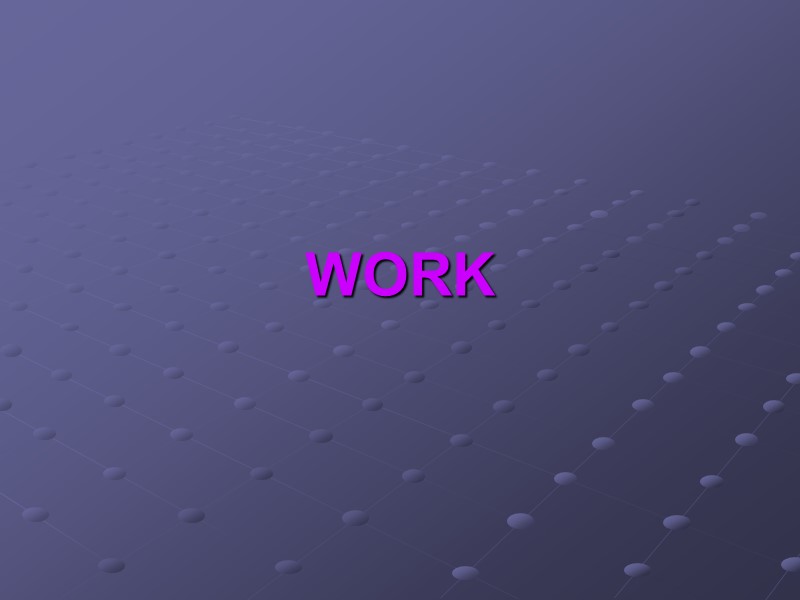
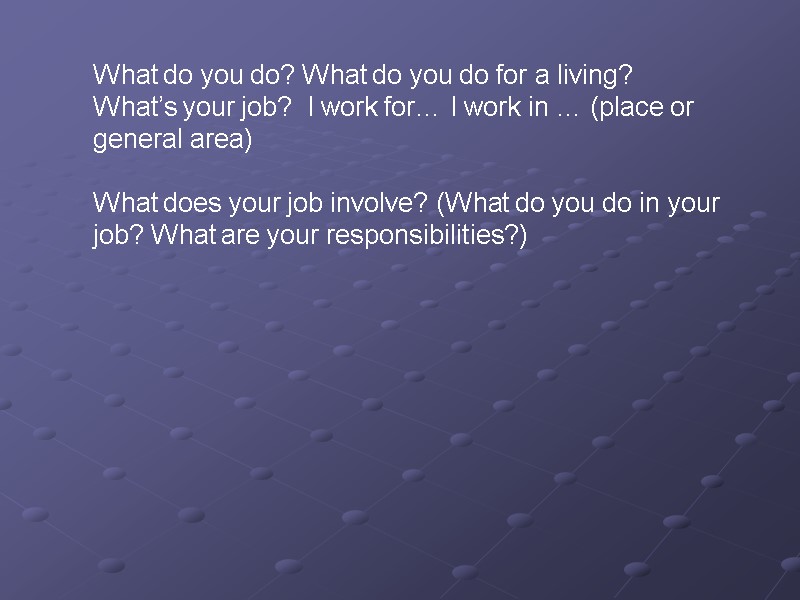
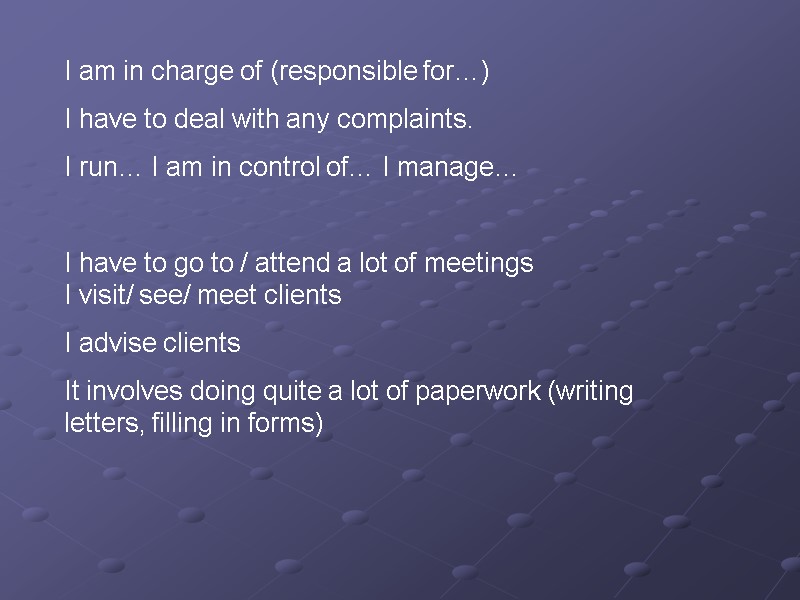
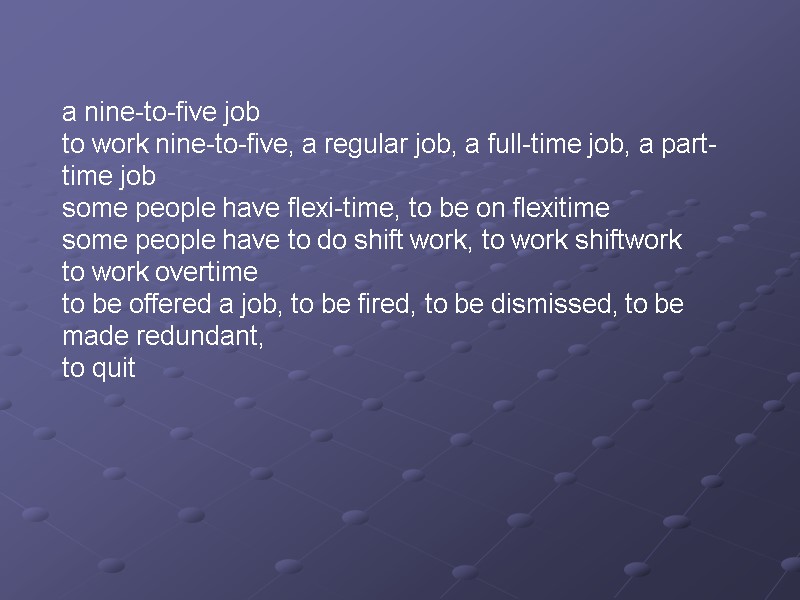
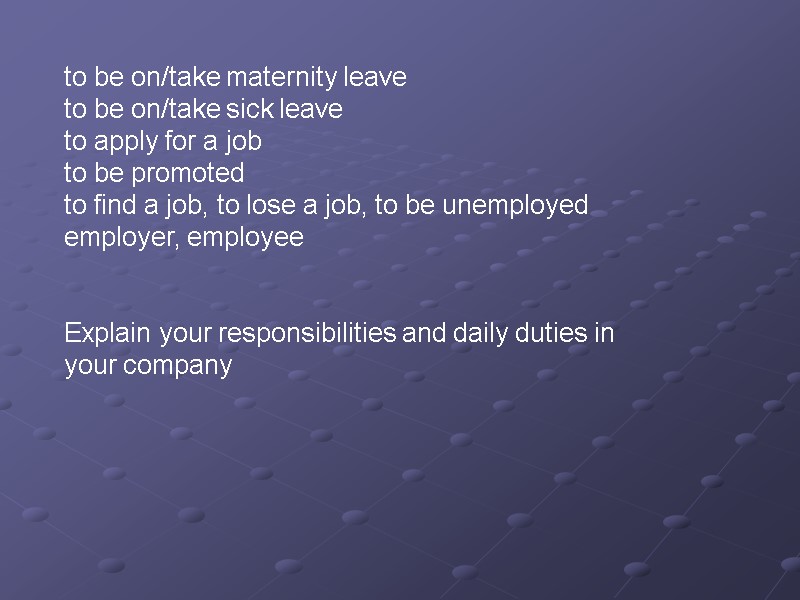
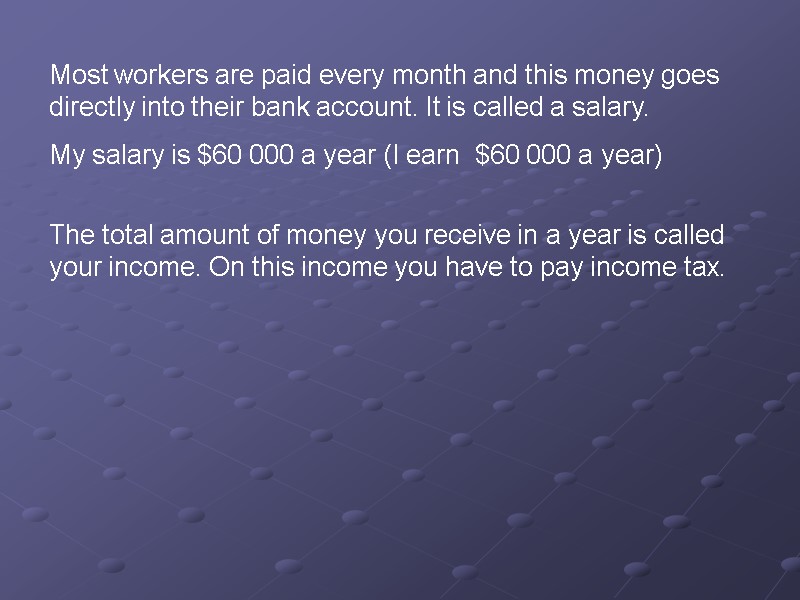
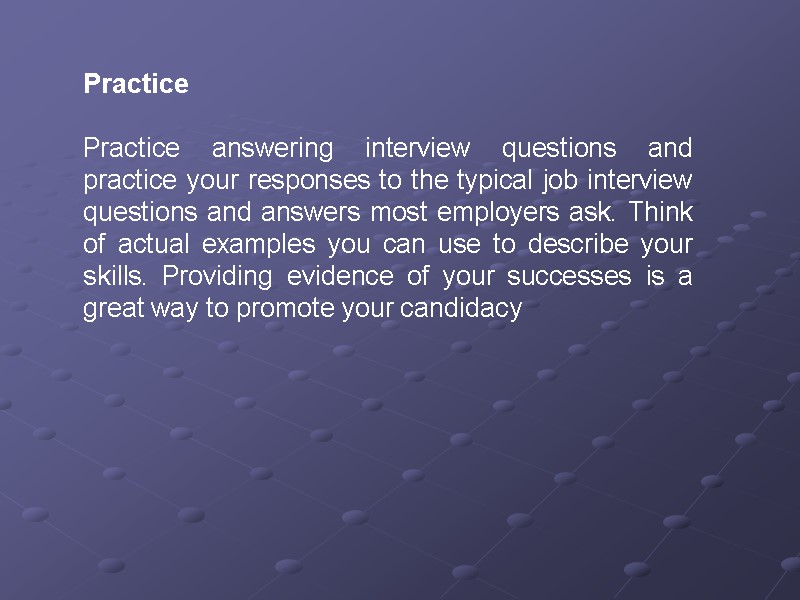
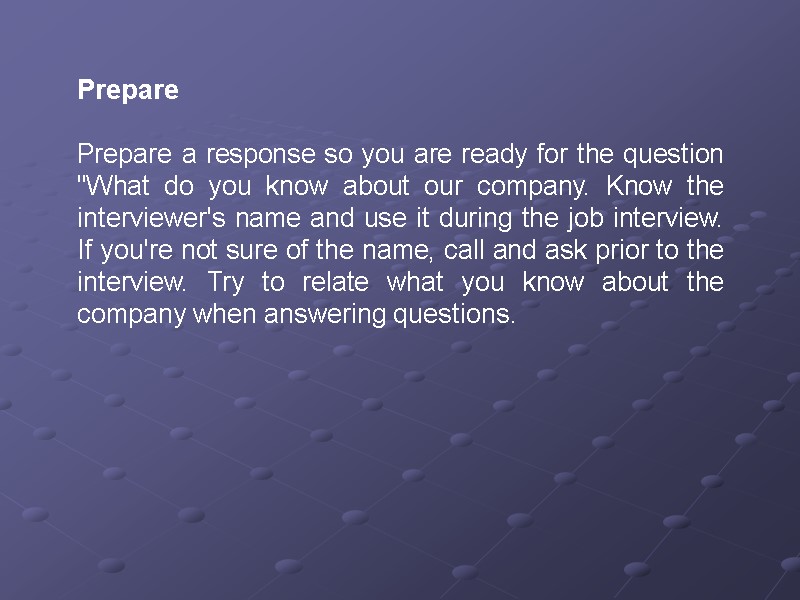
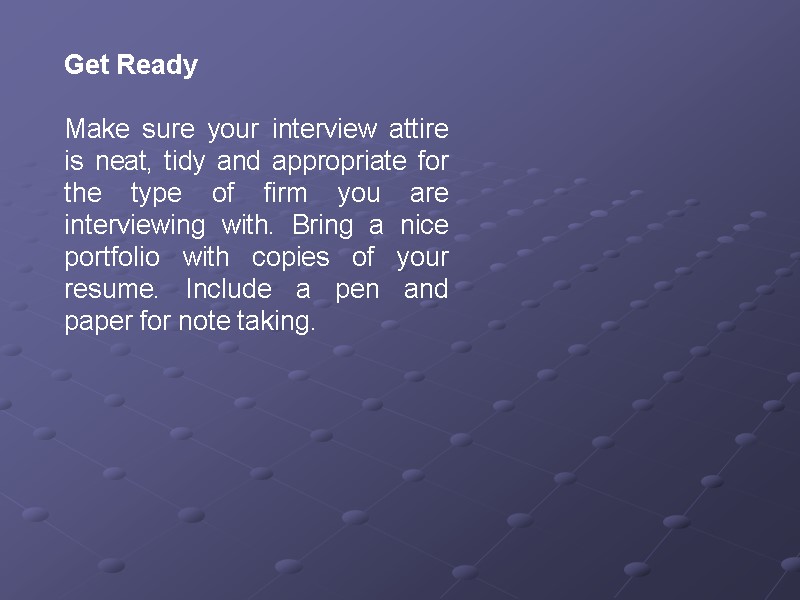
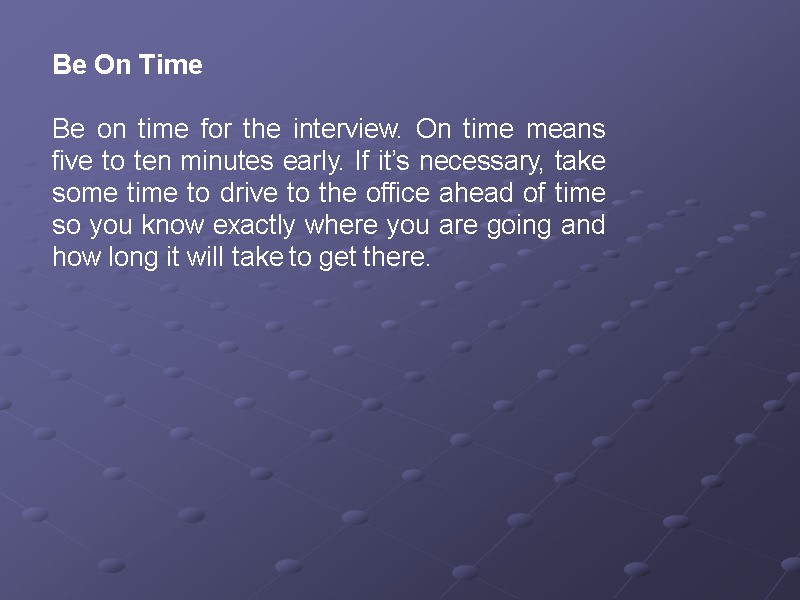
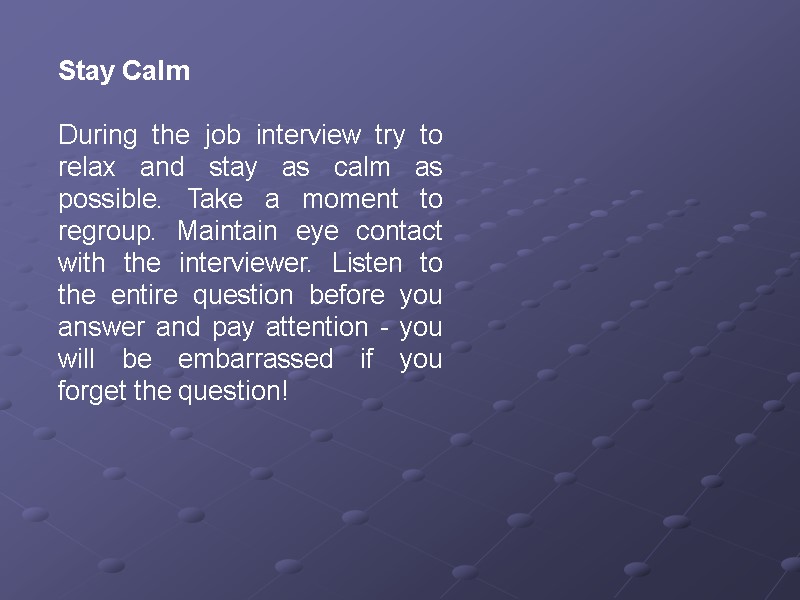
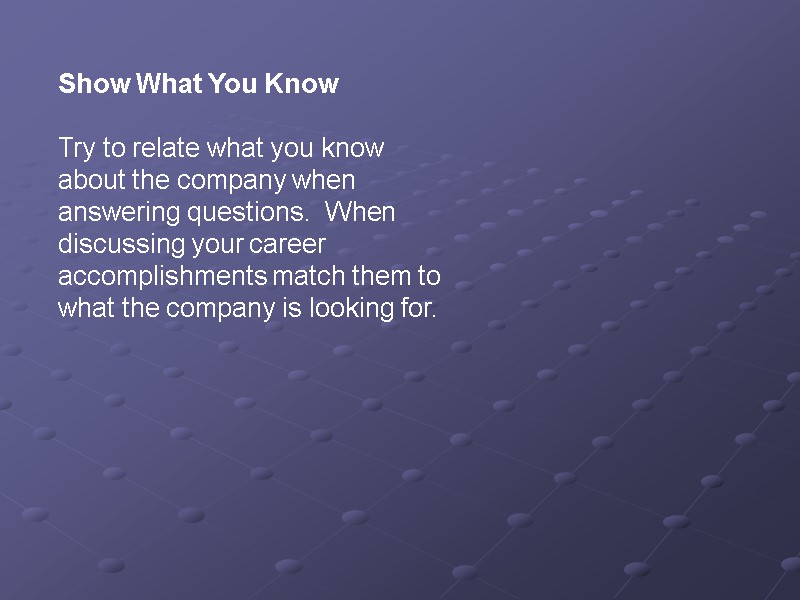
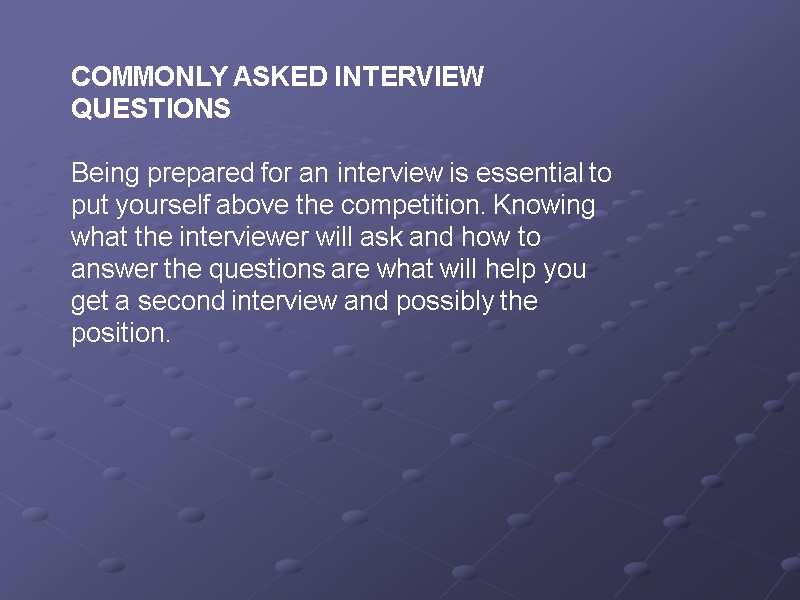
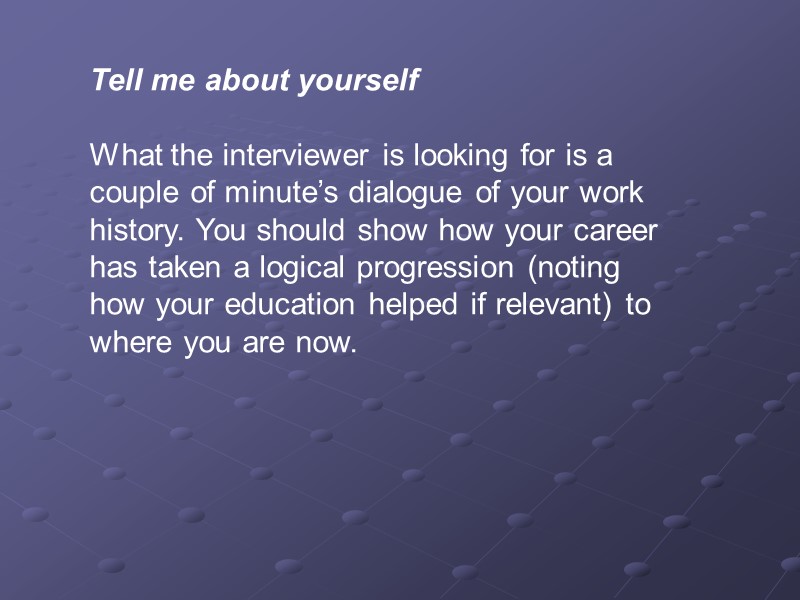
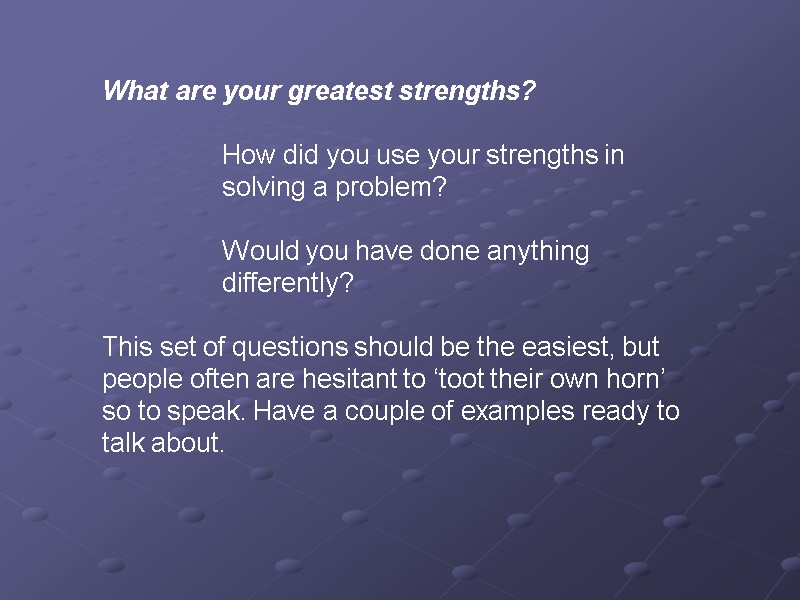
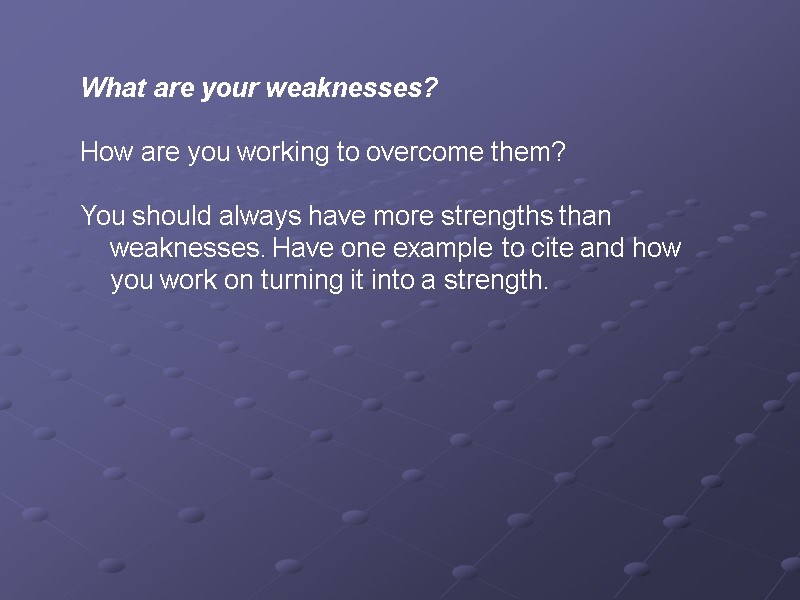
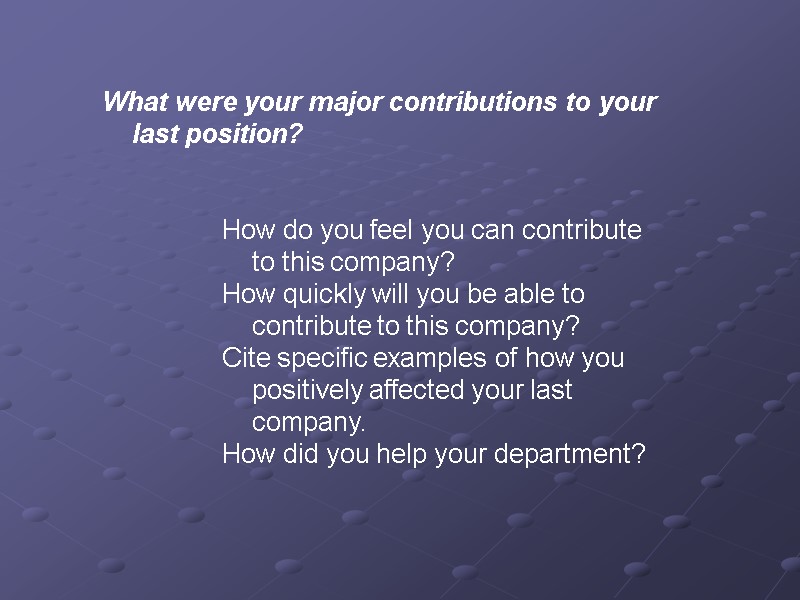
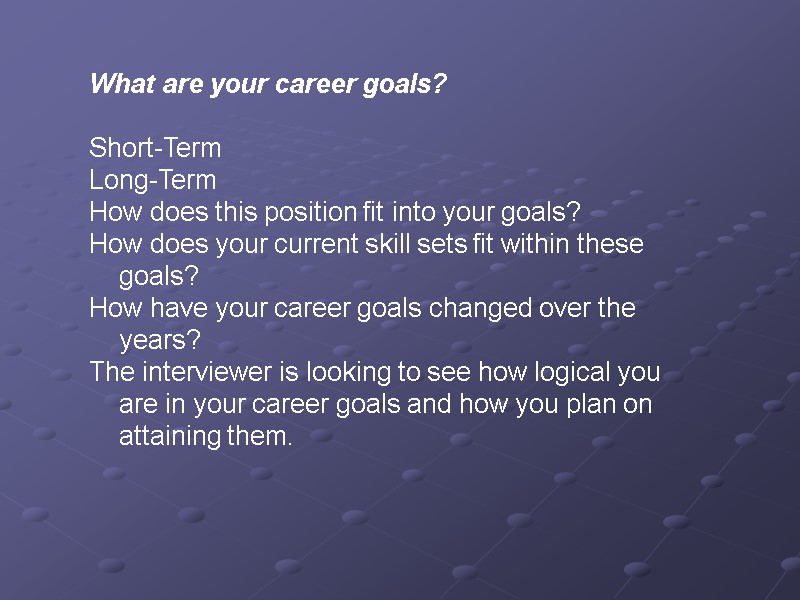
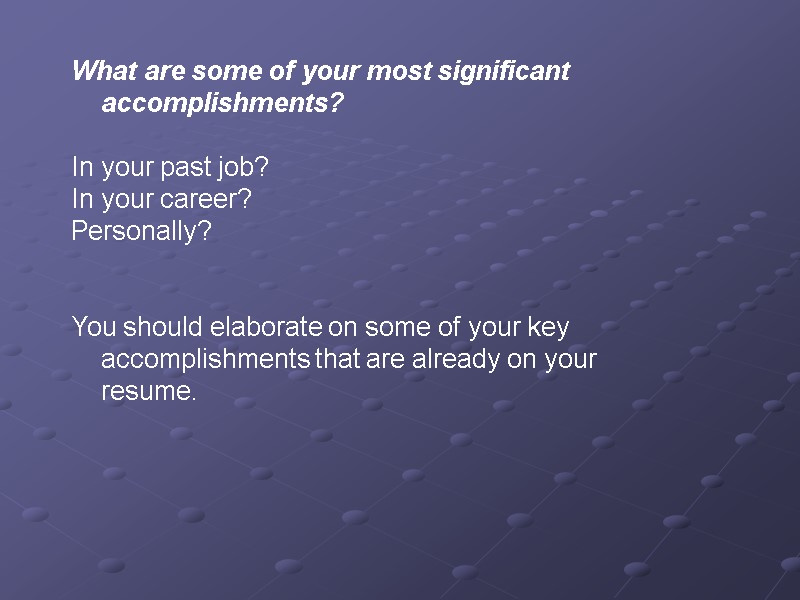
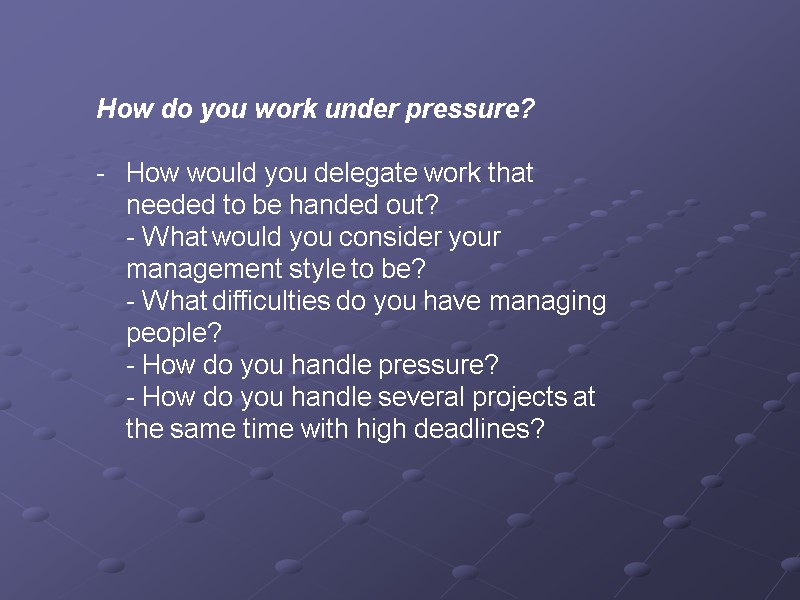
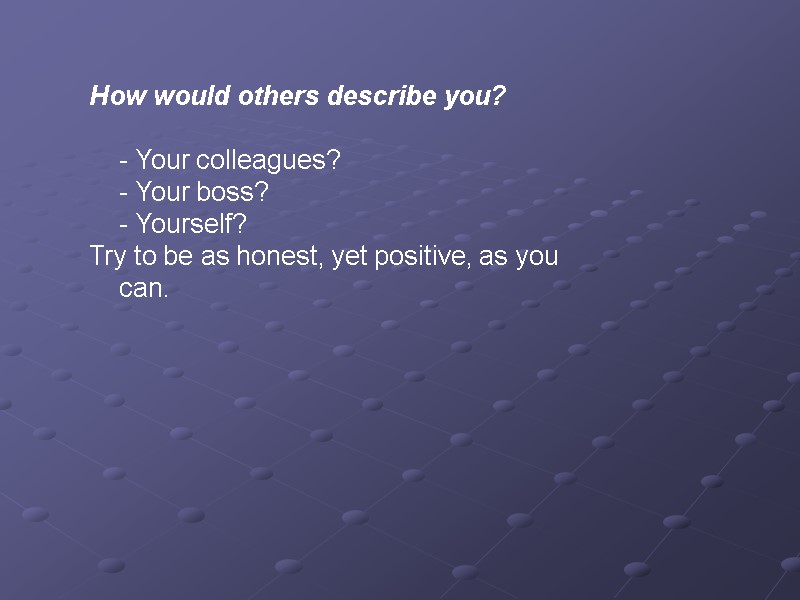
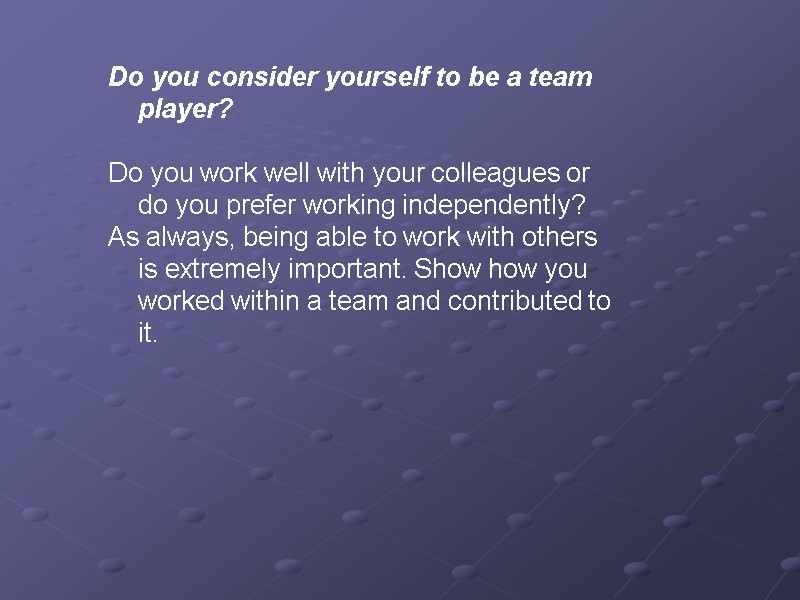
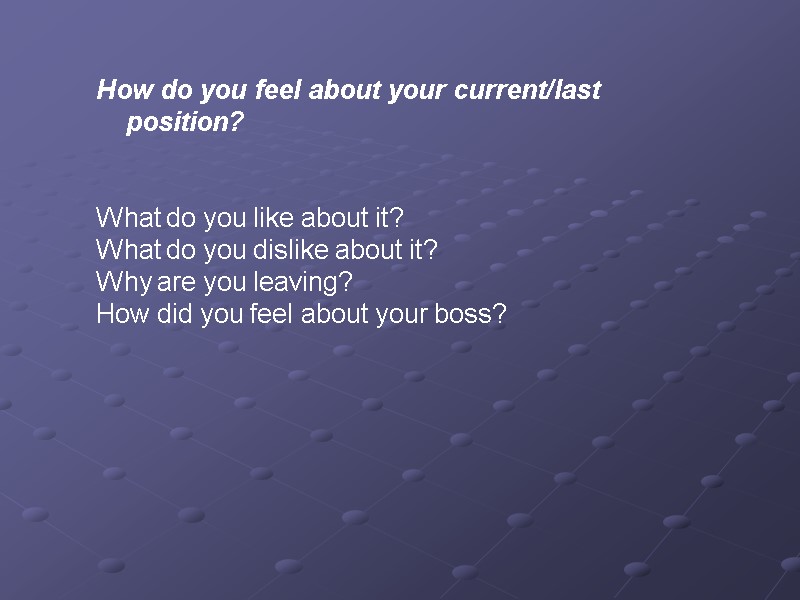
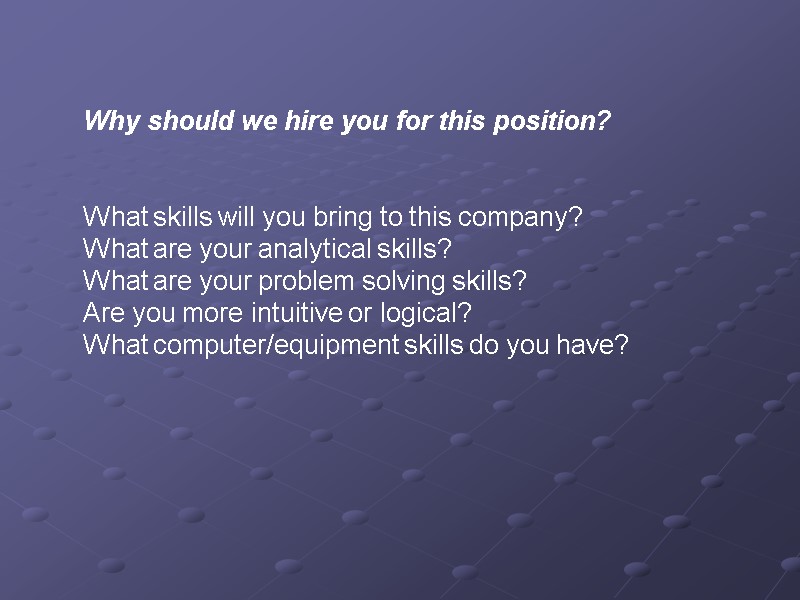
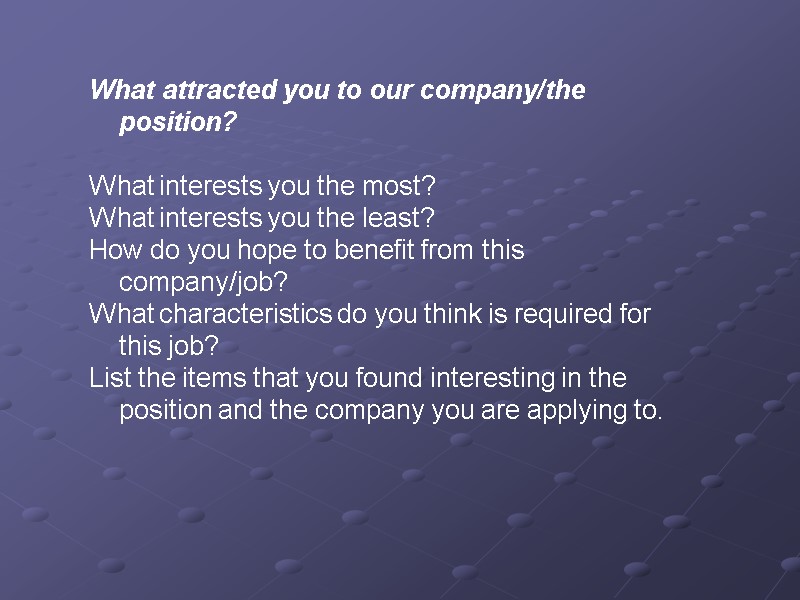

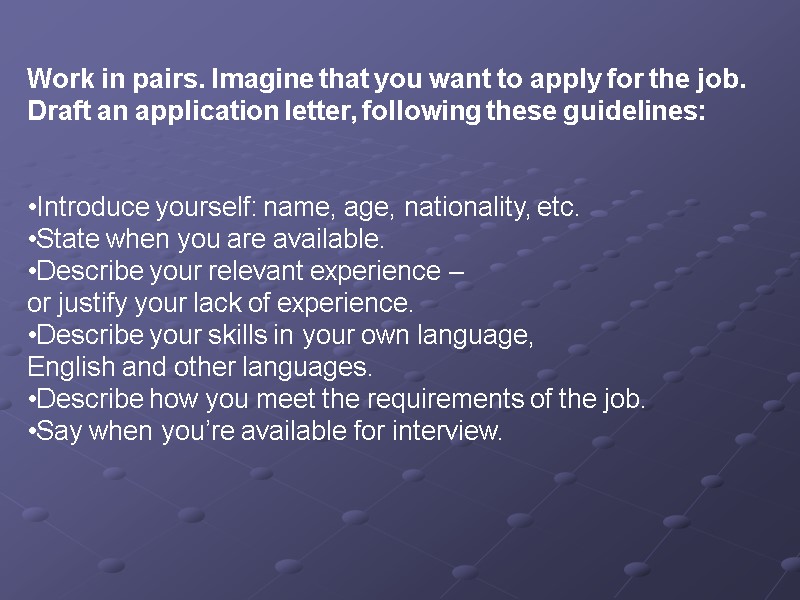
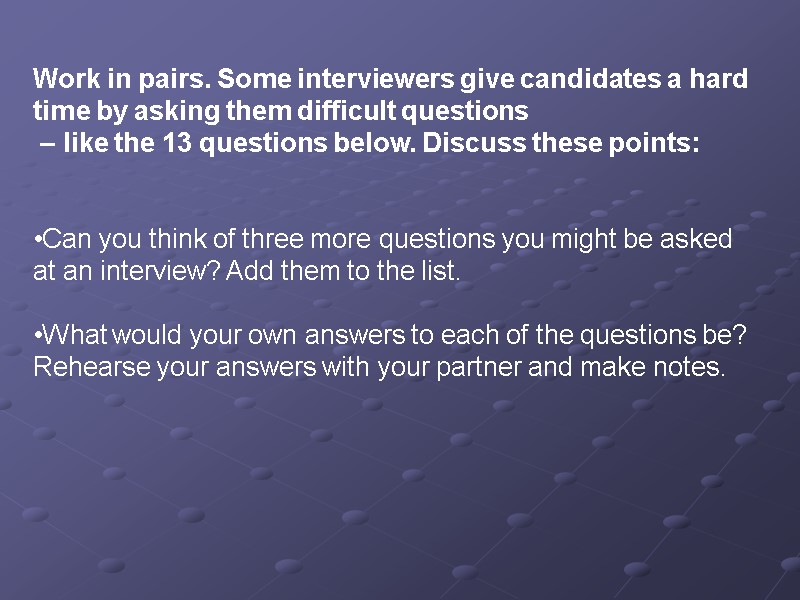
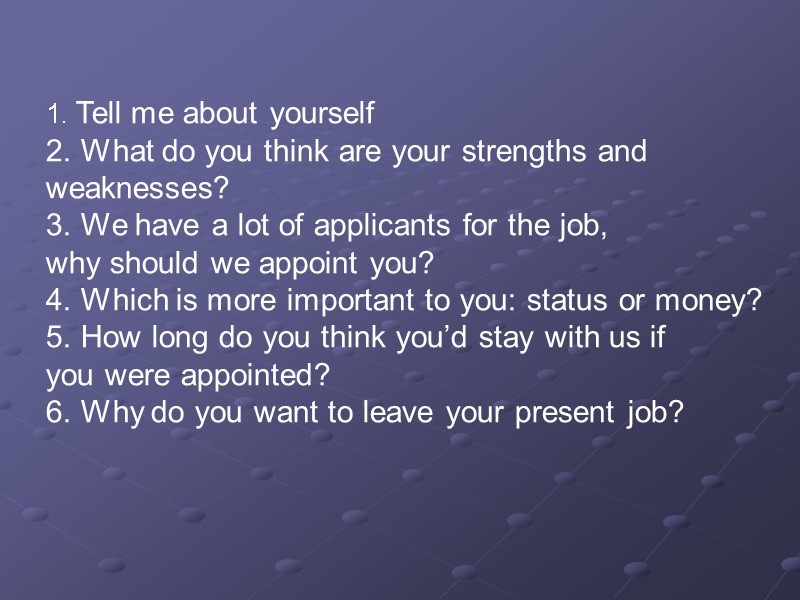
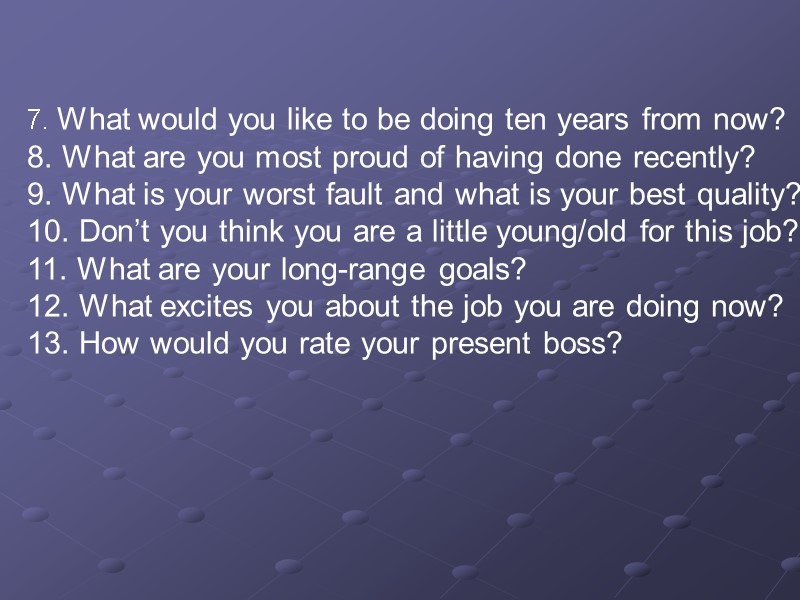
 WORK
WORK
 What do you do? What do you do for a living? What’s your job? I work for… I work in … (place or general area) What does your job involve? (What do you do in your job? What are your responsibilities?)
What do you do? What do you do for a living? What’s your job? I work for… I work in … (place or general area) What does your job involve? (What do you do in your job? What are your responsibilities?)
 I am in charge of (responsible for…) I have to deal with any complaints. I run… I am in control of… I manage… I have to go to / attend a lot of meetings I visit/ see/ meet clients I advise clients It involves doing quite a lot of paperwork (writing letters, filling in forms)
I am in charge of (responsible for…) I have to deal with any complaints. I run… I am in control of… I manage… I have to go to / attend a lot of meetings I visit/ see/ meet clients I advise clients It involves doing quite a lot of paperwork (writing letters, filling in forms)
 a nine-to-five job to work nine-to-five, a regular job, a full-time job, a part-time job some people have flexi-time, to be on flexitime some people have to do shift work, to work shiftwork to work overtime to be offered a job, to be fired, to be dismissed, to be made redundant, to quit
a nine-to-five job to work nine-to-five, a regular job, a full-time job, a part-time job some people have flexi-time, to be on flexitime some people have to do shift work, to work shiftwork to work overtime to be offered a job, to be fired, to be dismissed, to be made redundant, to quit
 to be on/take maternity leave to be on/take sick leave to apply for a job to be promoted to find a job, to lose a job, to be unemployed employer, employee Explain your responsibilities and daily duties in your company
to be on/take maternity leave to be on/take sick leave to apply for a job to be promoted to find a job, to lose a job, to be unemployed employer, employee Explain your responsibilities and daily duties in your company
 Most workers are paid every month and this money goes directly into their bank account. It is called a salary. My salary is $60 000 a year (I earn $60 000 a year) The total amount of money you receive in a year is called your income. On this income you have to pay income tax.
Most workers are paid every month and this money goes directly into their bank account. It is called a salary. My salary is $60 000 a year (I earn $60 000 a year) The total amount of money you receive in a year is called your income. On this income you have to pay income tax.
 Practice Practice answering interview questions and practice your responses to the typical job interview questions and answers most employers ask. Think of actual examples you can use to describe your skills. Providing evidence of your successes is a great way to promote your candidacy
Practice Practice answering interview questions and practice your responses to the typical job interview questions and answers most employers ask. Think of actual examples you can use to describe your skills. Providing evidence of your successes is a great way to promote your candidacy
 Prepare Prepare a response so you are ready for the question "What do you know about our company. Know the interviewer's name and use it during the job interview. If you're not sure of the name, call and ask prior to the interview. Try to relate what you know about the company when answering questions.
Prepare Prepare a response so you are ready for the question "What do you know about our company. Know the interviewer's name and use it during the job interview. If you're not sure of the name, call and ask prior to the interview. Try to relate what you know about the company when answering questions.
 Get Ready Make sure your interview attire is neat, tidy and appropriate for the type of firm you are interviewing with. Bring a nice portfolio with copies of your resume. Include a pen and paper for note taking.
Get Ready Make sure your interview attire is neat, tidy and appropriate for the type of firm you are interviewing with. Bring a nice portfolio with copies of your resume. Include a pen and paper for note taking.
 Be On Time Be on time for the interview. On time means five to ten minutes early. If it’s necessary, take some time to drive to the office ahead of time so you know exactly where you are going and how long it will take to get there.
Be On Time Be on time for the interview. On time means five to ten minutes early. If it’s necessary, take some time to drive to the office ahead of time so you know exactly where you are going and how long it will take to get there.
 Stay Calm During the job interview try to relax and stay as calm as possible. Take a moment to regroup. Maintain eye contact with the interviewer. Listen to the entire question before you answer and pay attention - you will be embarrassed if you forget the question!
Stay Calm During the job interview try to relax and stay as calm as possible. Take a moment to regroup. Maintain eye contact with the interviewer. Listen to the entire question before you answer and pay attention - you will be embarrassed if you forget the question!
 Show What You Know Try to relate what you know about the company when answering questions. When discussing your career accomplishments match them to what the company is looking for.
Show What You Know Try to relate what you know about the company when answering questions. When discussing your career accomplishments match them to what the company is looking for.
 COMMONLY ASKED INTERVIEW QUESTIONS Being prepared for an interview is essential to put yourself above the competition. Knowing what the interviewer will ask and how to answer the questions are what will help you get a second interview and possibly the position.
COMMONLY ASKED INTERVIEW QUESTIONS Being prepared for an interview is essential to put yourself above the competition. Knowing what the interviewer will ask and how to answer the questions are what will help you get a second interview and possibly the position.
 Tell me about yourself What the interviewer is looking for is a couple of minute’s dialogue of your work history. You should show how your career has taken a logical progression (noting how your education helped if relevant) to where you are now.
Tell me about yourself What the interviewer is looking for is a couple of minute’s dialogue of your work history. You should show how your career has taken a logical progression (noting how your education helped if relevant) to where you are now.
 What are your greatest strengths? How did you use your strengths in solving a problem? Would you have done anything differently? This set of questions should be the easiest, but people often are hesitant to ‘toot their own horn’ so to speak. Have a couple of examples ready to talk about.
What are your greatest strengths? How did you use your strengths in solving a problem? Would you have done anything differently? This set of questions should be the easiest, but people often are hesitant to ‘toot their own horn’ so to speak. Have a couple of examples ready to talk about.
 What are your weaknesses? How are you working to overcome them? You should always have more strengths than weaknesses. Have one example to cite and how you work on turning it into a strength.
What are your weaknesses? How are you working to overcome them? You should always have more strengths than weaknesses. Have one example to cite and how you work on turning it into a strength.
 What were your major contributions to your last position? How do you feel you can contribute to this company? How quickly will you be able to contribute to this company? Cite specific examples of how you positively affected your last company. How did you help your department?
What were your major contributions to your last position? How do you feel you can contribute to this company? How quickly will you be able to contribute to this company? Cite specific examples of how you positively affected your last company. How did you help your department?
 What are your career goals? Short-Term Long-Term How does this position fit into your goals? How does your current skill sets fit within these goals? How have your career goals changed over the years? The interviewer is looking to see how logical you are in your career goals and how you plan on attaining them.
What are your career goals? Short-Term Long-Term How does this position fit into your goals? How does your current skill sets fit within these goals? How have your career goals changed over the years? The interviewer is looking to see how logical you are in your career goals and how you plan on attaining them.
 What are some of your most significant accomplishments? In your past job? In your career? Personally? You should elaborate on some of your key accomplishments that are already on your resume.
What are some of your most significant accomplishments? In your past job? In your career? Personally? You should elaborate on some of your key accomplishments that are already on your resume.
 How do you work under pressure? How would you delegate work that needed to be handed out? - What would you consider your management style to be? - What difficulties do you have managing people? - How do you handle pressure? - How do you handle several projects at the same time with high deadlines?
How do you work under pressure? How would you delegate work that needed to be handed out? - What would you consider your management style to be? - What difficulties do you have managing people? - How do you handle pressure? - How do you handle several projects at the same time with high deadlines?
 How would others describe you? - Your colleagues? - Your boss? - Yourself? Try to be as honest, yet positive, as you can.
How would others describe you? - Your colleagues? - Your boss? - Yourself? Try to be as honest, yet positive, as you can.
 Do you consider yourself to be a team player? Do you work well with your colleagues or do you prefer working independently? As always, being able to work with others is extremely important. Show how you worked within a team and contributed to it.
Do you consider yourself to be a team player? Do you work well with your colleagues or do you prefer working independently? As always, being able to work with others is extremely important. Show how you worked within a team and contributed to it.
 How do you feel about your current/last position? What do you like about it? What do you dislike about it? Why are you leaving? How did you feel about your boss?
How do you feel about your current/last position? What do you like about it? What do you dislike about it? Why are you leaving? How did you feel about your boss?
 Why should we hire you for this position? What skills will you bring to this company? What are your analytical skills? What are your problem solving skills? Are you more intuitive or logical? What computer/equipment skills do you have?
Why should we hire you for this position? What skills will you bring to this company? What are your analytical skills? What are your problem solving skills? Are you more intuitive or logical? What computer/equipment skills do you have?
 What attracted you to our company/the position? What interests you the most? What interests you the least? How do you hope to benefit from this company/job? What characteristics do you think is required for this job? List the items that you found interesting in the position and the company you are applying to.
What attracted you to our company/the position? What interests you the most? What interests you the least? How do you hope to benefit from this company/job? What characteristics do you think is required for this job? List the items that you found interesting in the position and the company you are applying to.
 What type of salary would you expect for this type of position?
What type of salary would you expect for this type of position?
 Work in pairs. Imagine that you want to apply for the job. Draft an application letter, following these guidelines: Introduce yourself: name, age, nationality, etc. State when you are available. Describe your relevant experience – or justify your lack of experience. Describe your skills in your own language, English and other languages. Describe how you meet the requirements of the job. Say when you’re available for interview.
Work in pairs. Imagine that you want to apply for the job. Draft an application letter, following these guidelines: Introduce yourself: name, age, nationality, etc. State when you are available. Describe your relevant experience – or justify your lack of experience. Describe your skills in your own language, English and other languages. Describe how you meet the requirements of the job. Say when you’re available for interview.
 Work in pairs. Some interviewers give candidates a hard time by asking them difficult questions – like the 13 questions below. Discuss these points: Can you think of three more questions you might be asked at an interview? Add them to the list. What would your own answers to each of the questions be? Rehearse your answers with your partner and make notes.
Work in pairs. Some interviewers give candidates a hard time by asking them difficult questions – like the 13 questions below. Discuss these points: Can you think of three more questions you might be asked at an interview? Add them to the list. What would your own answers to each of the questions be? Rehearse your answers with your partner and make notes.
 1. Tell me about yourself 2. What do you think are your strengths and weaknesses? 3. We have a lot of applicants for the job, why should we appoint you? 4. Which is more important to you: status or money? 5. How long do you think you’d stay with us if you were appointed? 6. Why do you want to leave your present job?
1. Tell me about yourself 2. What do you think are your strengths and weaknesses? 3. We have a lot of applicants for the job, why should we appoint you? 4. Which is more important to you: status or money? 5. How long do you think you’d stay with us if you were appointed? 6. Why do you want to leave your present job?
 7. What would you like to be doing ten years from now? 8. What are you most proud of having done recently? 9. What is your worst fault and what is your best quality? 10. Don’t you think you are a little young/old for this job? 11. What are your long-range goals? 12. What excites you about the job you are doing now? 13. How would you rate your present boss?
7. What would you like to be doing ten years from now? 8. What are you most proud of having done recently? 9. What is your worst fault and what is your best quality? 10. Don’t you think you are a little young/old for this job? 11. What are your long-range goals? 12. What excites you about the job you are doing now? 13. How would you rate your present boss?

